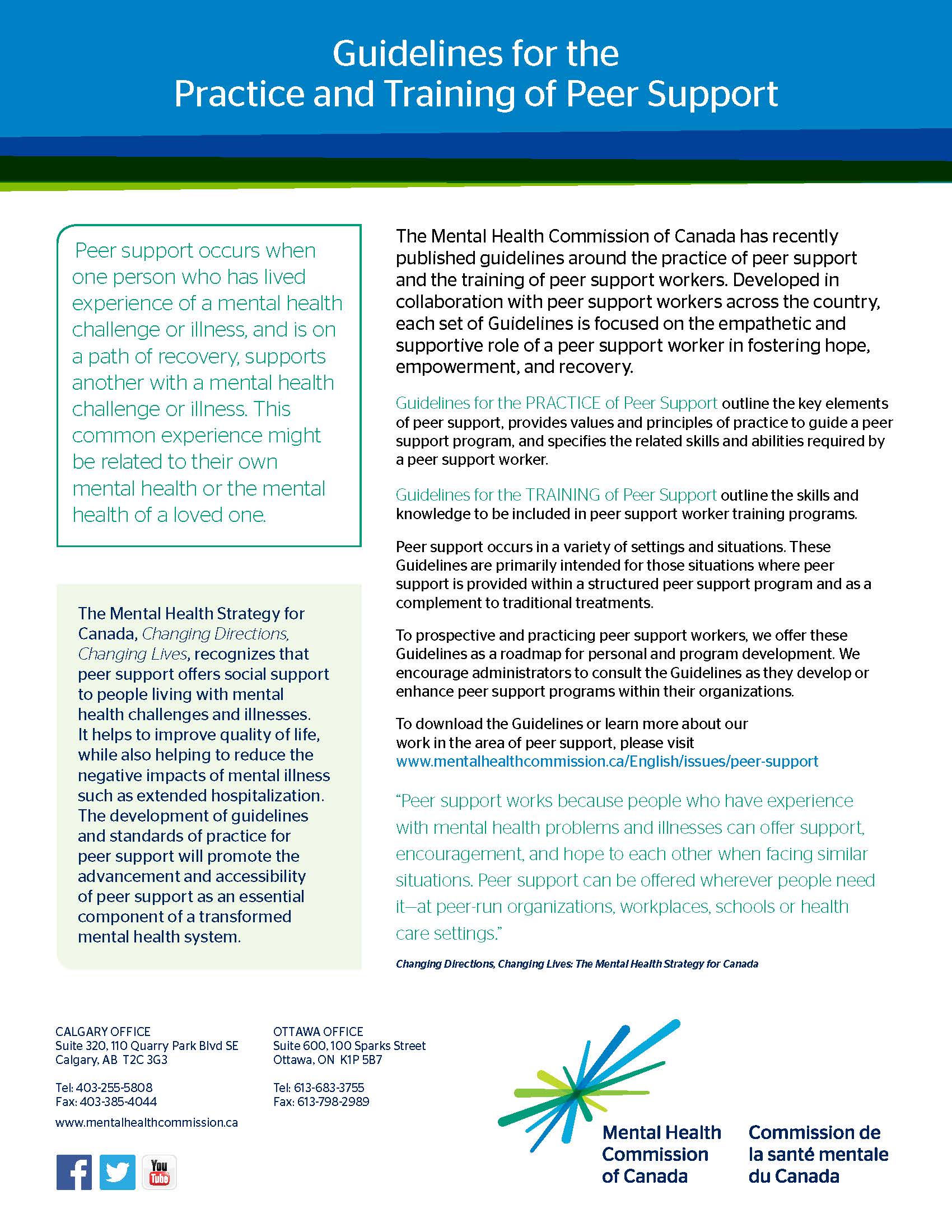If you are in distress, you can call or text 988 at any time. If it is an emergency, call 9-1-1 or go to your local emergency department.
- Guidelines, Professional Resources
Peer Support Guidelines – One Pager
Peer support occurs when one person who has lived experience of a mental health challenge or illness, and is on a path of recovery, supports another with a mental health challenge or illness. This common experience might be related to their own mental health or the mental health of a loved one. The Mental Health Commission of Canada has recently published guidelines around the practice of peer support and the training of peer support workers. Developed in collaboration with peer support workers across the country, each set of Guidelines is focused on the empathetic and supportive role of a peer support worker in fostering hope, empowerment, and recovery. Guidelines for the PRACTICE of Peer Support outline the key elements of peer support, provides values and principles of practice to guide a peer support program, and specifies the related skills and abilities required by a peer support worker. Guidelines for the TRAINING of Peer Support outline the skills and knowledge to be included in peer support worker training programs. To prospective and practicing peer support workers, we offer these Guidelines as a roadmap for personal and program development. We encourage administrators to consult the Guidelines as they develop or enhance peer support programs within their organizations. “Peer support works because people who have experience with mental health problems and illnesses can offer support, encouragement, and hope to each other when facing similar situations. Peer support can be offered wherever people need it—at peer-run organizations, workplaces, schools or health care settings.” Changing Directions, Changing Lives: The Mental Health Strategy for Canada The Mental Health Strategy for Canada, Changing Directions, Changing Lives, recognizes that peer support offers social support to people living with mental health challenges and illnesses. It helps to improve quality of life, while also helping to reduce the negative impacts of mental illness such as extended hospitalization. The development of guidelines and standards of practice for peer support will promote the advancement and accessibility of peer support as an essential component of a transformed mental health system.
Peer support occurs in a variety of settings and situations. These Guidelines are primarily intended for those situations where peer support is provided within a structured peer support program and as a complement to traditional treatments.
To download the Guidelines or learn more about our work in the area of peer support, please check here.
- Guidelines, Professional Resources
Peer Support Guidelines – One Pager
Peer Support Guidelines – One Pager
- Peer support
Peer support occurs when one person who has lived experience of a mental health challenge or illness, and is on a path of recovery, supports another with a mental health challenge or illness. This common experience might be related to their own mental health or the mental health of a loved one. The Mental Health Commission of Canada has recently published guidelines around the practice of peer support and the training of peer support workers. Developed in collaboration with peer support workers across the country, each set of Guidelines is focused on the empathetic and supportive role of a peer support worker in fostering hope, empowerment, and recovery. Guidelines for the PRACTICE of Peer Support outline the key elements of peer support, provides values and principles of practice to guide a peer support program, and specifies the related skills and abilities required by a peer support worker. Guidelines for the TRAINING of Peer Support outline the skills and knowledge to be included in peer support worker training programs. To prospective and practicing peer support workers, we offer these Guidelines as a roadmap for personal and program development. We encourage administrators to consult the Guidelines as they develop or enhance peer support programs within their organizations. “Peer support works because people who have experience with mental health problems and illnesses can offer support, encouragement, and hope to each other when facing similar situations. Peer support can be offered wherever people need it—at peer-run organizations, workplaces, schools or health care settings.” Changing Directions, Changing Lives: The Mental Health Strategy for Canada The Mental Health Strategy for Canada, Changing Directions, Changing Lives, recognizes that peer support offers social support to people living with mental health challenges and illnesses. It helps to improve quality of life, while also helping to reduce the negative impacts of mental illness such as extended hospitalization. The development of guidelines and standards of practice for peer support will promote the advancement and accessibility of peer support as an essential component of a transformed mental health system.
Peer support occurs in a variety of settings and situations. These Guidelines are primarily intended for those situations where peer support is provided within a structured peer support program and as a complement to traditional treatments.
To download the Guidelines or learn more about our work in the area of peer support, please check here.
SHARE THIS PAGE
RELATED

Review our Assessment Framework for Mental Health Apps — a national framework containing key standards for safe, quality, and effective mental health apps in Canada.

To help expand the use of e-mental health services, we developed four online learning modules based on our Toolkit for E-Mental Health Implementation, in collaboration with the Centre for Addiction and Mental Health (CAMH).

Stepped Care 2.0© (SC2.0) is a transformative model for organizing and delivering evidence-informed mental health and substance use services.
